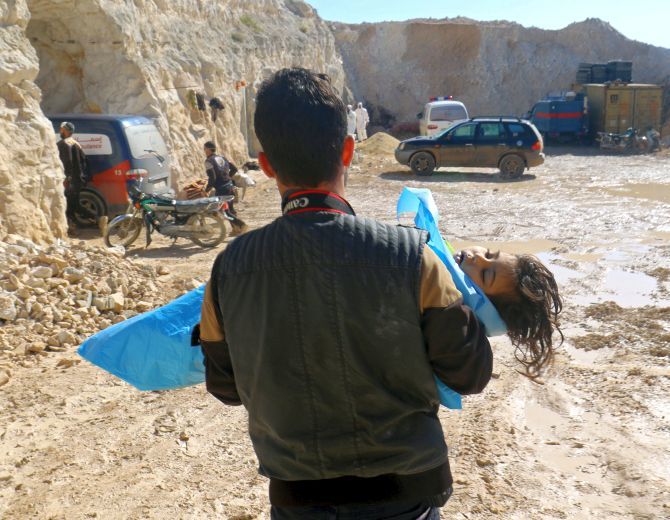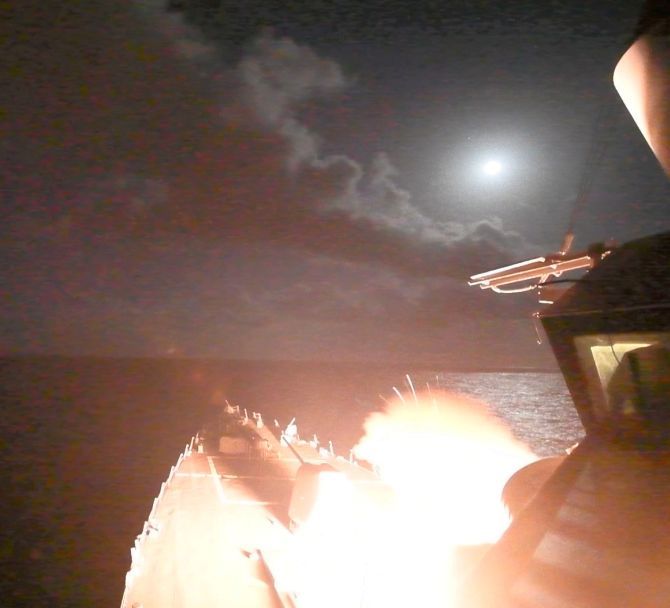'There seem to be no reason why Assad should have launched such an attack when he was gaining acceptability,' says Brigadier S K Chatterji (retd).

On Tuesday, April 4, fairly early in the morning, residents of Khan Sheikhun, a small town in Idlib, Syria that has witnessed enough violence already, was taking the toll from another Syrian air attack.
It was no different from any other except that when the first responders came close to the site they were incapacitated.
Effects of the sarin gas, a devastating nerve agent that the Syrians experienced in 2013 when President Bashar al-Assad used it against rebels opposed to his regime.
The casualties then were about 1,000 people. This time, it is close to 90 lives.
There is a small hitch when it comes to pinning responsibility on Assad for the outrage.
The Russian version accepts the Syrian air attack, but debates the issue of Assad using chemical weapons.
The Russians elaborate that the airstrikes hit a rebel-run toxic gas manufacturing unit, and the leakage was from stockpiles therein.
While America and its allies will believe the first version, the Russians, Iranians and others will surely go with the other narrative.
In the fog of war, the issue will be contested against these opposing backdrops at international fora, notwithstanding the fact that President Donald J Trump has delivered judgment.
His sentence has also been executed: 59 Tomahawk missiles having flattened Syria's Shyrat airbase on the night of April 6-7.
Chinese President Xi Jinping was dining with Trump when the Tomahawks took flight at 7.40 pm Eastern April 6. The Tomahawks delivered his message covering a broad bandwidth to the Chinese and the world at large.
For the Chinese, the most conspicuous message was that the Americans will not accept gross violation of international conventions in the South China Sea.
China has stated it will not abide by the international court of arbitration's ruling in the Philippines' favour in the South China Sea case. Further, declaring an air defence zone over the South China Sea is also not acceptable to anyone.
The Tomahawks may have conveyed Trump's inclination to react adequately should the Chinese push the envelope further.
The Chinese official reaction has been muted with its foreign ministry spokesperson calling for the 'relevant parties to stay calm, exercise restraint and avoid doing anything that might raise tensions.'
For the Russians, the Tomahawks' message was quite cryptic.
Notwithstanding Trump's much touted Russian leanings, the red lines in US-Russian relations remain just about where they were in Barack Obama's final years in office.
Senior Pentagon officials have confirmed that they are probing the possibility of the Russians participating in the chemical attack.

The most explicit message is perhaps meant for the North Koreans.
The Americans have already threatened to use force after North Korea's recent missile test. A massive naval exercise involving Japan, South Korea and the US has already churned the waters in the Korean Sea.
Notwithstanding the North Korean foreign minister calling the US action in Syria 'an unforgivable act of aggression,' that the American missiles could fly North Korea's way is Washington's simple message to Pyongyang.
For European Union countries and NATO members, the Americans use of force to uphold international conventions must be most enthralling. Trump's insistence on EU countries strengthening their defences and paying for it had given an impression that his commitment to Europe was less than his predecessors.
The response in Syria will reaffirm his commitment to Europe while underscoring his message to NATO and EU members to spend more on defence.
Saudi Arabia, Qatar, Turkey -- all American allies fighting or supporting one faction or the other in Syria against ISIS -- welcomed the American response. How Turkey will manage its relationship with Russia post its support for the US strikes will be worth following.
Surely, if Assad planned the attack, he couldn't have ruled out American retaliation.
The fact that Obama held back from attacking Syrian targets in 2013 -- when Assad decided to sign the chemical weapons ban after the chemical attacks in Ghouta, Damascus -- may have lured him into giving it a shot again.
The American response pushes him back to the wall. In the short term, ISIS may benefit.
With a huge rift between the Americans and the Russians, operations of most parties fighting ISIS may suffer, especially air operations that require greater coordination.
The Russians have already threatened to stop operational coordination. The chances of coordination in the impending battle for Raqqa also dissipates substantially.
For the Americans who voted Trump to the presidency, he has surely become an instant hero. The man whose ratings were plummeting swiftly would surely have climbed the charts overnight.
The incident brings to fore the inconsistencies in Trump's pre-poll rhetoric of America First and not getting involved in others' wars. Not too many Americans will mind the switch, not in this case at least.
Finally, though there is no evidence that Putin was in the know, American Secretary of State Rex Tillerson -- who as Exxon chairman dealt frequently with the Russian leader -- termed Moscow's role to be: 'Either complicit or incompetent in its role of overseeing Syria's supposed removal of chemical weapons.'
Nikki Haley, the US permanent representative to the United Nations -- gave the impression that the US accepts that Assad has a role in Syria.
There seem to be no reason why Assad should have launched such an attack when he was gaining acceptability.
MORE features in the RELATED LINKS below...










